We hope these selections serve to educate and encourage a dialogue around advocacy, activism and allyship in relation to social justice issues.
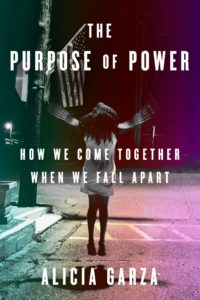 The Purpose of Power: How We Come Together When We Fall Apart by Alicia Garza
The Purpose of Power: How We Come Together When We Fall Apart by Alicia Garza
“Coupled with the speed and networking capacities of social media, #blacklivesmatter was the hashtag heard round the world. But Alicia Garza well knew that the distance between a hashtag and real change would take more than a single facebook to cover. It would take a movement. Garza was a lifelong activist who had spent the previous decades educating herself on the hard lessons of organizing. She started as a kid, working on sexual education for her peers, and then moved on to major campaigns around housing, policing, and immigrant and labor rights in California and then nationally. The lessons she extracted were different from the “rules for radicals” that animated earlier generations of lefitists; they were also different than the charismatic, patriarchal model of the American Civil Rights Movement. She instead developed a mode of organizing based on creating deep connections with communities, forging multiracial, intersectional coalitions, and, most of all, calling in all sorts of people to join the fight for the world we all deserve. This is the story of an activist’s education on the streets and in the homes of regular people around the country who found ways to come together to create change. And it’s also a guide for anyone who wants to share in that education and help build sustainable movements for the 21st century at any level, whether you’re fighting for housing justice in your community or advocating for a political candidate or marching in the streets or just voting. It’s a new paradigm for change for a new generation of changemakers, from the mind and heart behind one of the most important movements of our time”– Provided by publisher.
Available Formats: Book, eBook
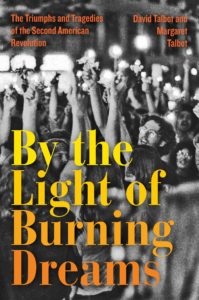 By the Light of Burning Dreams: The Triumphs and Tragedies of the Second American Revolution by David Talbot and Margaret Talbot
By the Light of Burning Dreams: The Triumphs and Tragedies of the Second American Revolution by David Talbot and Margaret Talbot
“The political landscape of the 1960s and 1970s was perhaps one of the most tumultuous in this country’s history, shaped by the fight for civil rights, women’s liberation, Black power, and the end to the Vietnam War. In many ways, this second American revolution was a belated fulfillment of the betrayed promises of the first, striving to extend the full protections of the Bill of Rights to non-white, non-male, non-elite Americans excluded by the nation’s founders. Based on exclusive interviews, original documents, and archival research, By the Light of Burning Dreams explores critical moments in the lives of a diverse cast of iconoclastic leaders of the twentieth century radical movement: Bobby Seale of the Black Panthers; Heather Booth and the Jane Collective, the first underground feminist abortion clinic; Vietnam War peace activists Tom Hayden and Jane Fonda; Cesar Chavez, Dolores Huerta and the United Farm Workers; Craig Rodwell and the Gay Pride movement; Dennis Banks, Madonna Thunder Hawk, Russell Means and the warriors of Wounded Knee; and John Lennon and Yoko Ono’s politics of stardom. Margaret and David Talbot reveal the epiphanies that galvanized these modern revolutionaries and created unexpected connections and alliances between individual movements and across race, class, and gender divides. America is still absorbing–and reacting against–the revolutionary forces of this tumultuous period. The change these leaders enacted demanded much of American society and the human imagination. By the Light of Burning Dreams is an immersive and compelling chronicle of seven lighting rods of change and the generation that engraved itself in American narrative–and set the stage for those today, fighting to bend forward the arc of history” — Amazon.com.
Available Formats: Book
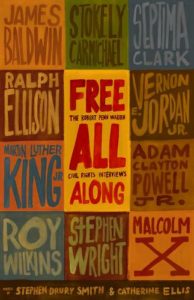 Free All Along: The Robert Penn Warren Civil Rights Interviews by Stephen Drury Smith (Editor), Catherine Ellis (Editor)
Free All Along: The Robert Penn Warren Civil Rights Interviews by Stephen Drury Smith (Editor), Catherine Ellis (Editor)
“A collection of previously unpublished interviews with key figures of the black freedom struggle by Pulitzer Prize-winning author Robert Penn Warren”– Provided by publisher.
Available Formats: Book
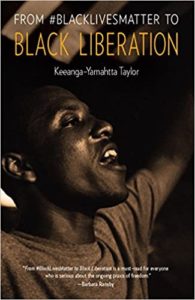 From #BlackLivesMatter to Black Liberation by Keeanga-Yamahtta Taylor
From #BlackLivesMatter to Black Liberation by Keeanga-Yamahtta Taylor
“The eruption of mass protests in the wake of the police murders of Michael Brown in Ferguson, Missouri and Eric Garner in New York City have challenged the impunity with which officers of the law carry out violence against Black people and punctured the illusion of a postracial America. The Black Lives Matter movement has awakened a new generation of activists. In this is stirring and insightful analysis, activist and scholar Keeanga-Yamahtta Taylor surveys the historical and contemporary ravages of racism and persistence of structural inequality such as mass incarceration and Black unemployment. In this context, she argues that this new struggle against police violence holds the potential to reignite a broader push for Black liberation.”– provided by publisher.
Available Formats: Book
 The Sports Revolution: How Texas Changed the Culture of American Athletics by Frank Andre Guridy
The Sports Revolution: How Texas Changed the Culture of American Athletics by Frank Andre Guridy
“The story of Texas’s impact on American sports culture during the civil rights and second-wave feminist movements, offering a new understanding of sports and society in the state and the nation as a whole”– Provided by publisher.
Available Formats: Book
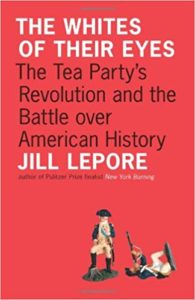 The Whites of Their Eyes by Jill Lepore
The Whites of Their Eyes by Jill Lepore
“Americans have always put the past to political ends. The Union laid claim to the Revolution–so did the Confederacy. Civil rights leaders said they were the true sons of liberty–so did Southern segregationists. This book tells the story of the centuries-long struggle over the meaning of the nation’s founding, including the battle waged by the Tea Party, Glenn Beck, Sarah Palin, and evangelical Christians to “take back America.”
Jill Lepore, Harvard historian and New Yorker staff writer, offers a wry and bemused look at American history according to the far right, from the “rant heard round the world,” which launched the Tea Party, to the Texas School Board’s adoption of a social-studies curriculum that teaches that the United States was established as a Christian nation. Along the way, she provides rare insight into the eighteenth-century struggle for independence–the real one, that is. Lepore traces the roots of the far right’s reactionary history to the bicentennial in the 1970s, when no one could agree on what story a divided nation should tell about its unruly beginnings. Behind the Tea Party’s Revolution, she argues, lies a nostalgic and even heartbreaking yearning for an imagined past–a time less troubled by ambiguity, strife, and uncertainty–a yearning for an America that never was.
The Whites of Their Eyes reveals that the far right has embraced a narrative about America’s founding that is not only a fable but is also, finally, a variety of fundamentalism–anti-intellectual, antihistorical, and dangerously antipluralist.” – Provided by Publisher
Available Formats: Book, eBook
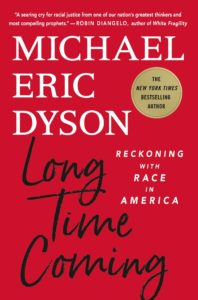 Long Time Coming: Reckoning with Race in America by Michael Eric Dyson
Long Time Coming: Reckoning with Race in America by Michael Eric Dyson
“From the New York Times bestselling author of Tears We Cannot Stop, a passionate call to America to finally reckon with race and start the journey to redemption. The night of May 25, 2020 changed America. George Floyd, a 43-year-old Black man, was killed during an arrest in Minneapolis when a white cop suffocated him. The video of that night’s events went viral, sparking the largest protests in the nation’s history and the sort of social unrest we have not seen since the sixties. While Floyd’s death was certainly the catalyst, (heightened by the fact that it occurred during a pandemic whose victims were disproportionately of color) it was in truth the fuse that lit an ever-filling powder keg. Long Time Coming grapples with the cultural and social forces that have shaped our nation in the brutal crucible of race. In five beautifully argued chapters-each addressed to a black martyr from Breonna Taylor to Rev. Clementa Pinckney-Dyson traces the genealogy of anti-blackness from the slave ship to the street corner where Floyd lost his life-and where America gained its will to confront the ugly truth of systemic racism. Ending with a poignant plea for hope, Dyson’s exciting new book points the way to social redemption. Long Time Coming is a necessary guide to help America finally reckon with race.”– Provided by publisher.
Available Formats: Book, Audiobook
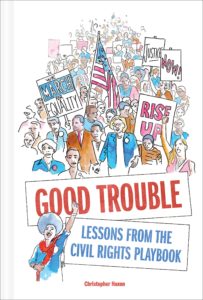 Good Trouble: Lessons from the Civil Rights Playbook by Christopher Noxon
Good Trouble: Lessons from the Civil Rights Playbook by Christopher Noxon
In words and vivid pen-and-watercolor illustrations, journalist Christopher Noxon dives into the real stories behind the front lines of the Montgomery bus boycott and the Greensboro lunch counter sit-ins and notable figures such as Rosa Parks and Bayard Rustin, all while exploring the parallels between the civil rights movement era and the present moment.” –provided by publisher.
Available Formats: Book
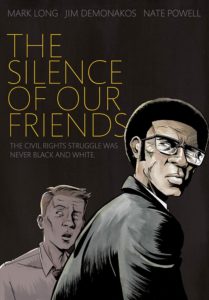 The Silence of Our Friends by Jim Demonakos and Mark Long
The Silence of Our Friends by Jim Demonakos and Mark Long
“As the civil rights struggle heats up in Texas, two families-one white, one black-find common ground.
This semi-autobiographical tale is set in 1967 Texas, against the backdrop of the fight for civil rights. A white family from a notoriously racist neighborhood in the suburbs and a black family from its poorest ward cross Houston’s color line, overcoming humiliation, degradation, and violence to win the freedom of five black college students unjustly charged with the murder of a policeman.
The Silence of Our Friends follows events through the point of view of young Mark Long, whose father is a reporter covering the story. Semi-fictionalized, this story has its roots solidly in very real events. With art from the brilliant Nate Powell (Swallow Me Whole) bringing the tale to heart-wrenching life, The Silence of Our Friends is a new and important entry in the body of civil rights literature.” – Provided by Publisher
Available Formats: Graphic Novel
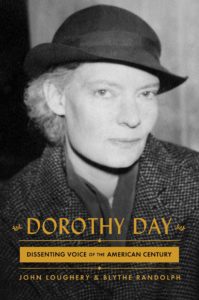 Dorothy Day: Dissenting Voice of the American Century by Blythe Randolph and John Loughery
Dorothy Day: Dissenting Voice of the American Century by Blythe Randolph and John Loughery
“After a middle-class Republican childhood and a few years as a Communist sympathizer, Dorothy Day converted to Catholicism and became an anomaly in American life for almost fifty years. As an orthodox Catholic, political radical, and a rebel who courted controversy, she attracted three generations of admirers. Day went to jail challenging the draft and the war in Vietnam. She was critical of capitalism and foreign policy, and as skeptical of modern liberalism as political conservatism. Her protests began in 1917, leading to her arrest during the suffrage demonstration outside President Wilson’s White House. In 1940 she spoke in Congress against the draft and urged young men not to register. She frequented jail throughout the 1950s protesting the nuclear arms race. She told audiences in 1962 that President Kennedy was as much to blame for the Cuban missile crisis. She refused to hear any criticism of the pope, though she sparred with American bishops and priests who lived in well-appointed rectories and tolerated racial segregation in their parishes. Dorothy Day is the exceptional biography of a dedicated modern-day pacifist, the most outspoken advocate for the poor, and a lifelong anarchist. This definitive and insightful account explores the influence this controversial and yet “sainted” woman still has today.”– Provided by publisher.
Available Formats: Book
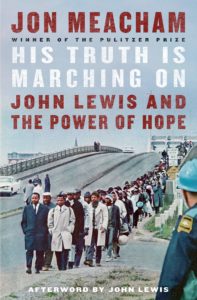 His Truth Is Marching On: John Lewis and the Power of Hope by Jon Meacham
His Truth Is Marching On: John Lewis and the Power of Hope by Jon Meacham
“John Lewis, who at age twenty-five marched in Selma and was beaten on the Edmund Pettus Bridge, is a visionary and a man of faith. Using intimate interviews with Lewis and his family and deep research into the history of the civil rights movement, Meacham writes of how the activist and leader was inspired by the Bible, his mother’s unbreakable spirit, his sharecropper father’s tireless ambition, and his teachers in nonviolence, Reverend James Lawson and Martin Luther King, Jr. A believer in hope above all else, Lewis learned from a young age that nonviolence was not only a tactic but a philosophy, a biblical imperative, and a transforming reality. At the age of four, Lewis, ambitious to become a preacher, practiced by preaching to the chickens he took care of. When his mother cooked one of the chickens, the boy refused to eat it–his first act of non-violent protest. Integral to Lewis’s commitment to bettering the nation was his faith in humanity and in God, and an unshakable belief in the power of hope. Meacham calls Lewis “as important to the founding of a modern and multiethnic twentieth- and twenty-first century America as Thomas Jefferson and James Madison and Samuel Adams were to the initial creation of the nation-state in the eighteenth century. He did what he did–risking limb and life to bear witness for the powerless in the face of the powerful–not in spite of America, but because of America, and not in spite of religion, but because of religion”– Provided by publisher.
Available Formats: Book, Audiobook, eBook, eAudiobook
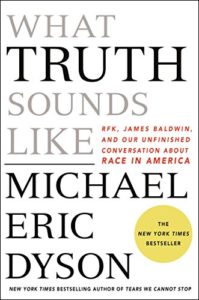 What Truth Sounds Like by Michael Eric Dyson
What Truth Sounds Like by Michael Eric Dyson
“In 1963 Attorney General Robert Kennedy sought out James Baldwin to explain the rage that threatened to engulf black America. Baldwin brought along some friends, including playwright Lorraine Hansberry, psychologist Kenneth Clark, and a valiant activist, Jerome Smith. It was Smith’s relentless, unfiltered fury that set Kennedy on his heels, reducing him to sullen silence. Kennedy walked away from the nearly three-hour meeting angry – that the black folk assembled didn’t understand politics, and that they weren’t as easy to talk to as Martin Luther King. But especially that they were more interested in witness than policy. But Kennedy’s anger quickly gave way to empathy, especially for Smith. “I guess if I were in his shoes…I might feel differently about this country.” Kennedy set about changing policy – the meeting having transformed his thinking in fundamental ways. There was more: every big argument about race that persists to this day got a hearing in that room. Smith declaring that he’d never fight for his country given its racist tendencies, and Kennedy being appalled at such lack of patriotism, tracks the disdain for black dissent in our own time. His belief that black folk were ungrateful for the Kennedys’ efforts to make things better shows up in our day as the charge that black folk wallow in the politics of ingratitude and victimhood. The contributions of black queer folk to racial progress still cause a stir. BLM has been accused of harboring a covert queer agenda. The immigrant experience, like that of Kennedy – versus the racial experience of Baldwin – is a cudgel to excoriate black folk for lacking hustle and ingenuity. The questioning of whether folk who are interracially partnered can authentically communicate black interests persists.” – Provided by Publisher
Available Formats: Book, Audiobook, eBook, eAudiobook
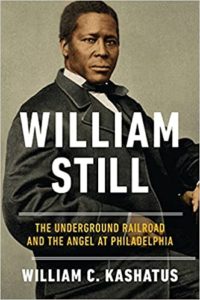 William Still: The Underground Railroad and the Angel at Philadelphia by William C. Kashatus
William Still: The Underground Railroad and the Angel at Philadelphia by William C. Kashatus
“William Still coordinated the Eastern Line of the Underground Railroad and was a pillar of the Railroad as a whole. Based in Philadelphia, Still built a reputation as a courageous leader, writer, philanthropist, and guide for fugitive slaves. This monumental work details Still’s life story beginning with his parents’ escape from bondage in the early nineteenth century and continuing through his youth and adulthood as one of the nation’s most important Underground Railroad agents and, later, as an early civil rights pioneer. Still worked personally with Harriet Tubman, assisted the family of John Brown, helped Brown’s associates escape from Harper’s Ferry after their famous raid, and was a rival to Frederick Douglass among nationally prominent African American abolitionists. Still’s life story is told in the broader context of the anti-slavery movement, Philadelphia Quaker and free black history, and the generational conflict that occurred between Still and a younger group of free black activists led by Octavius Catto.” – Provided by Publisher
Available Formats: Book
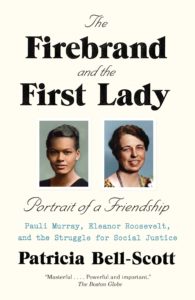 The Firebrand and the First Lady: Portrait of a Friendship : Pauli Murray, Eleanor Roosevelt, and the Struggle for Social Justice by Patricia Bell-Scott
The Firebrand and the First Lady: Portrait of a Friendship : Pauli Murray, Eleanor Roosevelt, and the Struggle for Social Justice by Patricia Bell-Scott
“Describes the unlikely friendship between First Lady Eleanor Roosevelt and Pauli Murray, a granddaughter of a mixed race slave and a lesbian, who became a lawyer and civil rights pioneer, and the important work they each did, taking stands for justice and freedom, “–NoveList.
Available Formats: Book
We love helping people find books, movies, and more.
Tell us about your preferences, and our librarians will create a list of titles selected specifically for you.